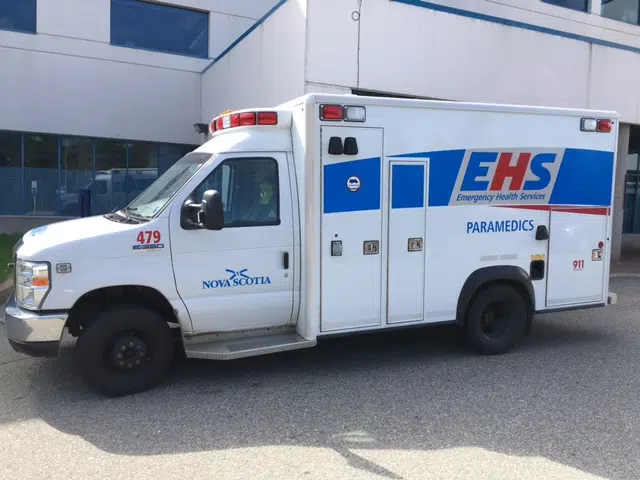
An EHS ambulance outside of South Shore Regional Hospital in Bridgewater, NS. Photo: Evan Taylor
Argyle-Barrington MLA Colton LeBlanc was pleased to see the province’s report on ambulances getting its release this week, but he still wishes it could have been made public earlier.
“I’ve heard media asking a lot if it was the #CodeCritical movement that led to its release, ultimately we don’t really know and you’d have to get the explanation from the Health Minister,” LeBlanc said.
The report which was produced by Fitch and Associates investigated the problems facing paramedics and ambulance services across the province. Completed in 2018, it includes 68 recommendations to help improve the services offered by EHS.
LeBlanc says the government has had the plan since 2019 but only started working on implementing it in 2020.
The findings did not surprise LeBlanc who previously worked as a paramedic. “The number one finding was that offloading patients at ERs is the biggest cause of limitation to EHS services,” he said.
LeBlanc says currently paramedics can wait hours trying to offload their patients which means they are unable to help people in need of their services elsewhere.
The Provincial government has kept the plan under wraps as they did not want it released before a new contract was reached with EHS, which was done on Monday.
The new contract includes 64 of the 68 recommendations included in the Fitch Report.
Although this is a step forward, LeBlanc suggests a holistic shift in public health would be required to fully ensure EHS is able to perform to the best of its abilities.
“Some of the things that require a change can’t be done from an EHS perspective and will require adaptations from the entire provincial government and Nova Scotia Health,” LeBlanc said.
He’s also concerned with the claim from the government that over 30 of the recommendations have already been implemented, saying “If some of the things that are meant to improve things have already been put in place it’s hard to see as things right now are the worst they’ve ever been for paramedics.”
LeBlanc says Nova Scotia needs to become less reliant on EHS as the first point of medical care in favour of helping more Nova Scotians in need of primary care physicians who he adds can help prevent trips to emergency departments via ambulance.
“Nova Scotia spends over $4-billion on health care every year and more and more Nova Scotians are questioning if they are getting value for what they are spending,” said LeBlanc. “Finding doctors for the 56,000 Nova Scotians is not going to happen overnight that’s why we are suggesting solutions that utilize virtual health solutions that can help alleviate the burden.”
The Fitch report was made publicly available on Monday and can be viewed in its entirety on the province’s government web site.








